Please welcome my guest to the Showcase.
Research for Historical Fiction – It’s Wonders and Pitfalls
©Inge H. Borg – August 2019
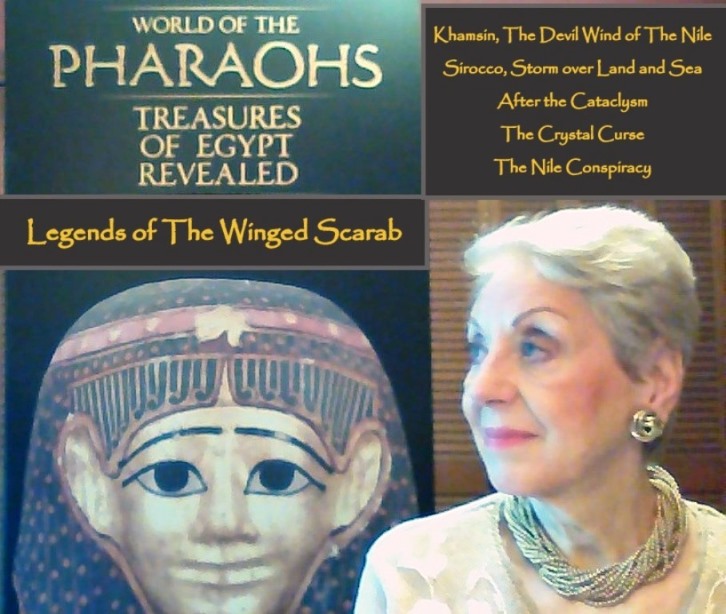
“So, you’ve been to Egypt?” It is the one thing I am invariably asked after I slide into a conversation that I wrote a novel about Ancient Egypt. (Hey, if I don’t peddle my books, who will?)
Me (slightly embarrassed): “Actually, no.” When I stop feeling duly chastised, I quickly add, “But who has then, five thousand years ago? My story unfolds around 3080 BCE.”
A shoulder shrug and averted eyes confirm it is too late to save the day, and no amount of sputtering about ‘research, and more research’ will pull this person back into a literary conversation. Or (be still my hopeful heart), into their desire to read (aka, buy) my books.
Thank goodness for the scores of dedicated readers who love not only history but a well-written yarn spun around it that puts flesh onto the brittle bones of fictional characters. If a writer is lucky, special readers (no, not necessarily just lonely women) might become so involved as to adore – even fall in love with – our heroes and heroines. Such engagement with a book can spell sweet success for the author. However, woe befalls him or her if one of those beloved protagonists is mistreated or killed off – even if great imagination, the action or historical facts demand it.
But (yes, there is a ‘but’), historical fiction writers better do their research and get it right. (Didn’t I already say that?) And therein lies the rub. It depends whose books and scientific articles one reads and in what order. The early historians were often unbending or even blustering fellows. Once they had submitted their findings to whatever authority put its stamp of approval onto their ‘papers’ pronouncing their theories as fact, they could no longer bow to new discoveries. I quickly realized this was especially true when it came to dates concerning the dark and distant past of lost cultures, such as the Old Kingdom of Ancient Egypt.
Was I to give credence to the Greek writer and explorer Herodotus (born c. 484 BCE) over the British Egyptologist E. A. Wallis Budge, born 1857?
When I started to write Khamsin, there was no Internet, no quickie “fact-checking” on Google, however erroneous. Rejection slips from agents and publishing houses put my manuscript back on the shelf for a decade – until the birth of Amazon and self-publishing.
But back to research: What about Dr. Joann Fletcher, supposedly unearthing a beautiful queen’s mystery in her book “The Search for Nefertiti,” versus Dr. Zahi Hawass, former secretary-general of Egypt’s Supreme Council of Antiquities and tempestuous TV Egyptologist, who vigorously doubted her findings? When still powerful, he liked to be called “The Pharaoh,” often denying foreign archaeologists access to important or newly discovered sites, just as his government long hid the existence of the fabled Lost Labyrinth of Egypt (a major site in Books 4 and 5 of my series).
Worth reading is an interesting albeit somewhat unflattering article published in 11/08/2009 by Ian Parker in The New Yorker, “Is Zahi Hawass bad for Egyptology?” https://www.newyorker.com/magazine/2009/11/16/the-pharaoh.
Is it a wonder – or perhaps sacrilege – that “my pharaoh,” the fictional on and off all-powerful director of the Cairo Museum, Dr. Jabari El-Masri, sports a jaunty Stetson à la Indiana Jones in Books 2-5 as well?
When things and especially dates became too conflicting around the beginning of the Old Kingdom, I had to remind myself that I was after all writing fiction. What really mattered were my characters, their interaction with each other, their intrigues, their forbidden love interests, their lust for power and gold, ending with their ultimate destiny to live or die (during a fierce khamsin, of course).
I trust it worked as the five-volume Legends of the Winged Scarab series evolved from my award-winning one-novel saga of Ancient Egypt (Khamsin, The Devil Wind of The Nile– Book 1) into modern-day actions and adventures.
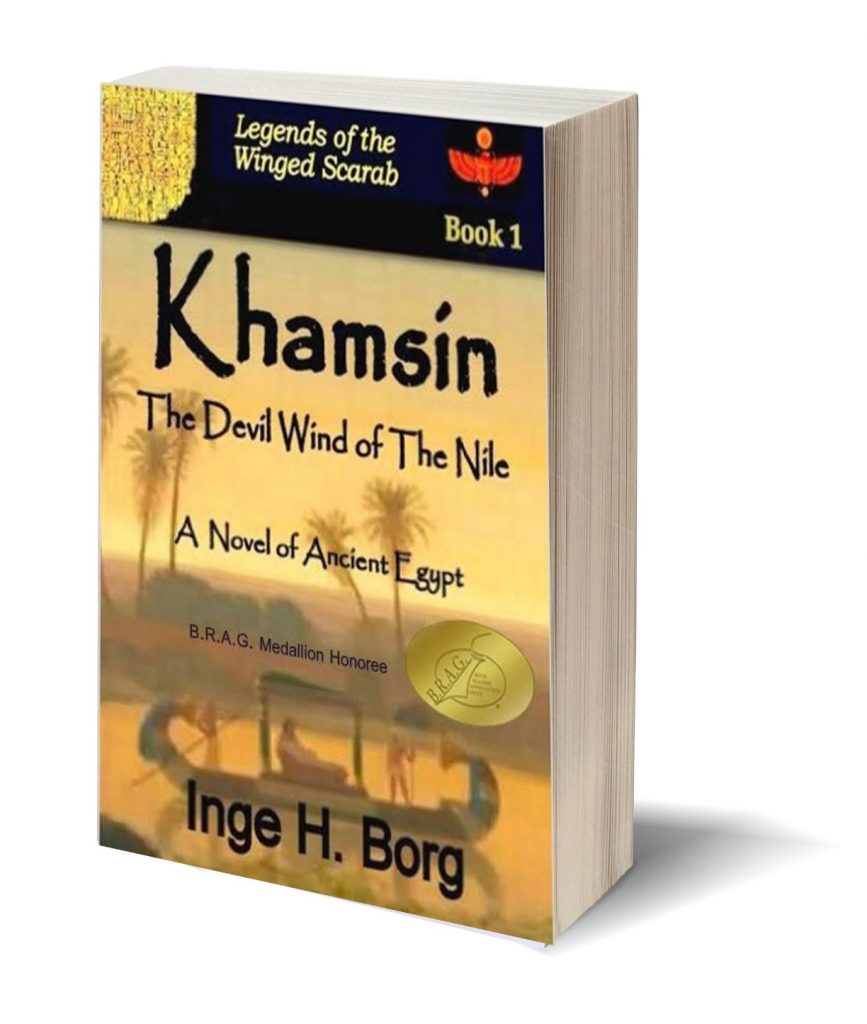
Sirocco, Storm over Land and Sea – Book 2 skips centuries forward into the Arab Spring of 2011 embroiling the protagonists in Egypt’s political mayhem.
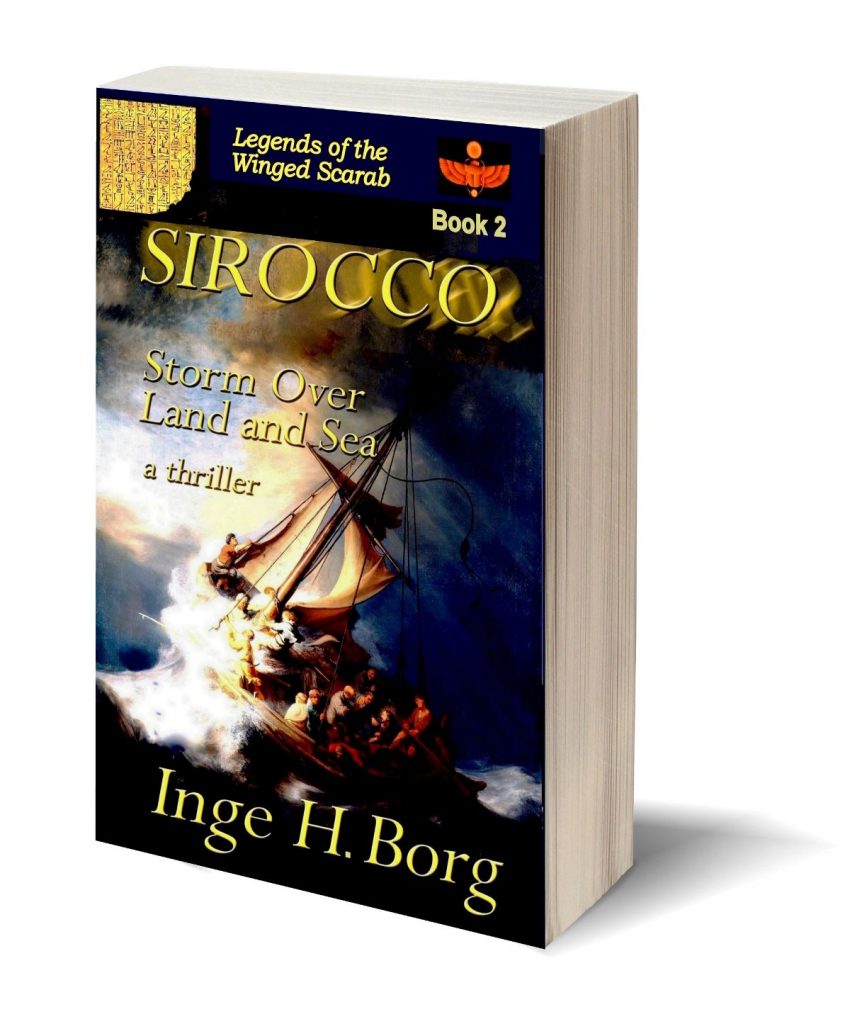
In After the Cataclysm – Book 3, the long-dormant Yellowstone Supervolcano finally blows its top. They have to flee the United States while chasing looted ancient gold throughout South America.
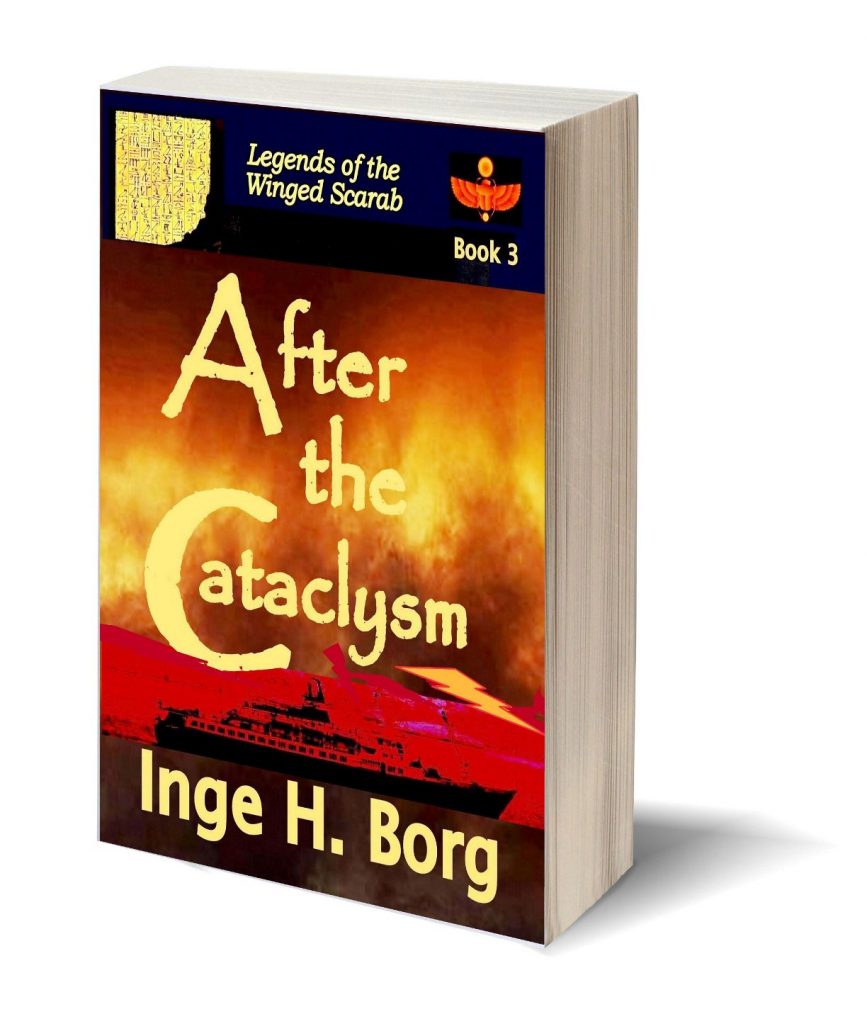
Another escape from a murderous South American art pirate has them sailing into the Mediterranean (The Crystal Curse – Book 4).
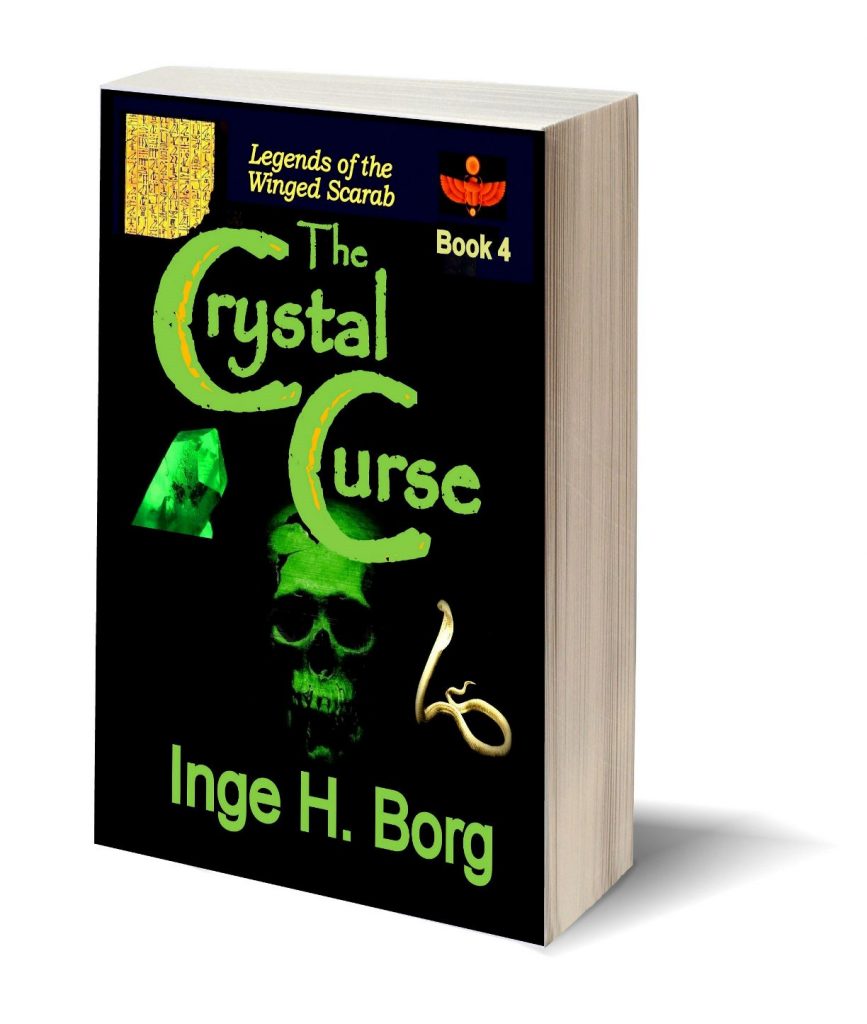
Soon we find my protagonists back in Egypt, getting embroiled in that country’s battle against the completion of Ethiopia’s (real) monster dam at the headwaters of the Blue Nile (The Nile Conspiracy – Book 5).
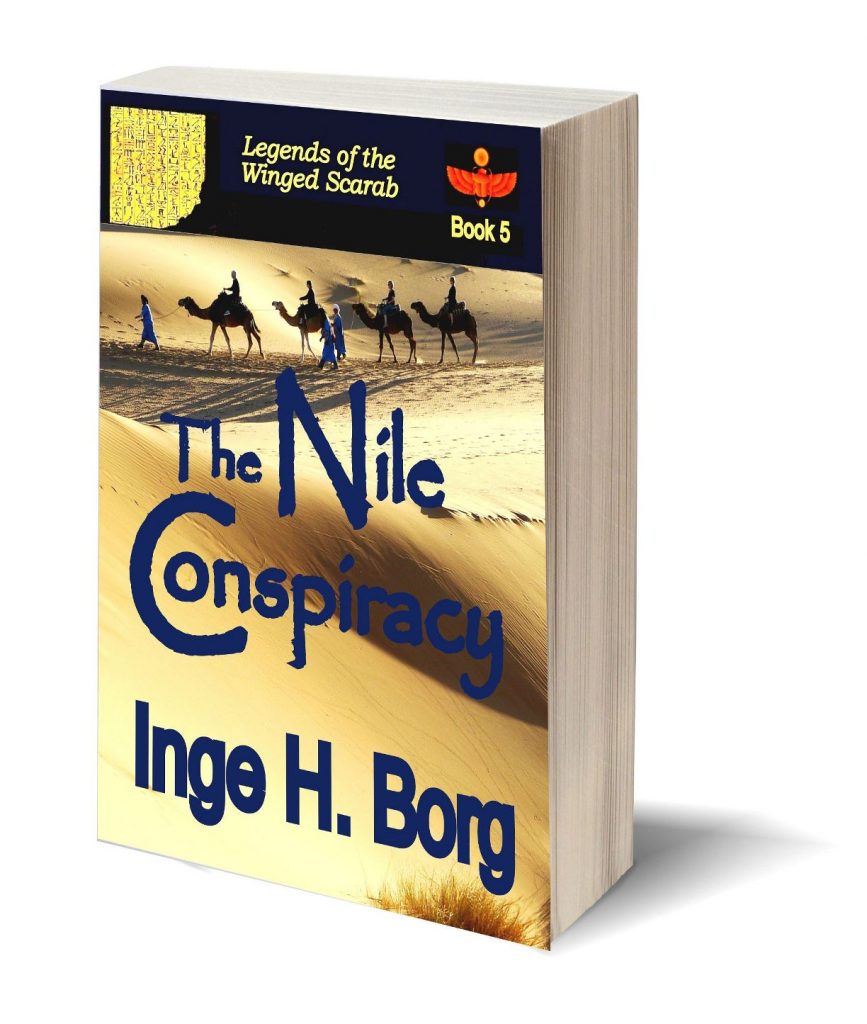
The subtle thread throughout the Legends is about a reawakened old soul; a sinner’s Ba that has yet to find atonement in our besieged modern world. Naturally, I burden my exotic present-day Egyptologist Naunet with the ancient spell embodies in Princess Nefret’s death mask. Can Naunet triumph over it or will she perish because of it as another fierce khamsin strikes the Valley of the Nile?
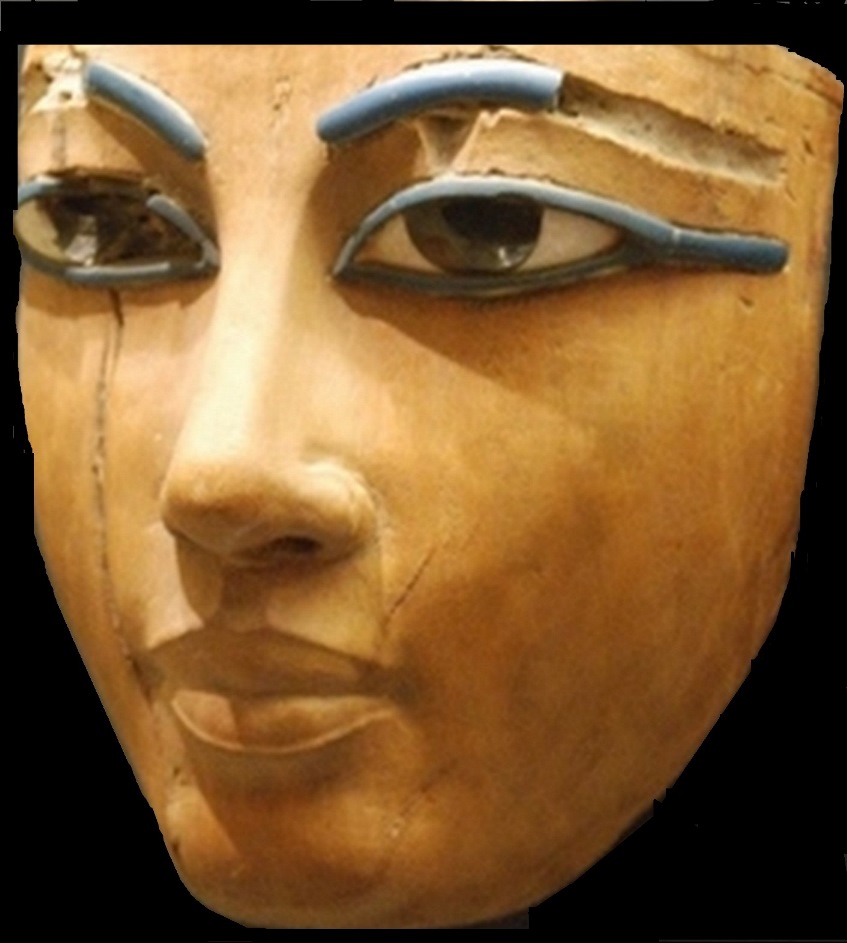
Early palace intrigue, warfare against Ancient Egypt’s southern borders, the priesthood’s knowledge and mystique (cleverly designed to cow the populace) are surpassed only by Man’s age-old greed for power and gold.
And there is young love: Forbidden, loyal, betrayed, hopefully to be reaffirmed; ultimately triumphant perhaps… [no spoilers here].
While the Legends of the Winged Scarab series is Historical Fiction, its bones are fused from meticulous research of historical findings, its muscle consist of true ancient and modern places and events, and its blood cursing through those veins carries the heroism, frailty, folly, passion and love of Man.
* * *
PS: Why not take advantage of Borg’s special
99c Promotion
for each of the five Legends of the Winged Scarab volumes,
through August 18th.
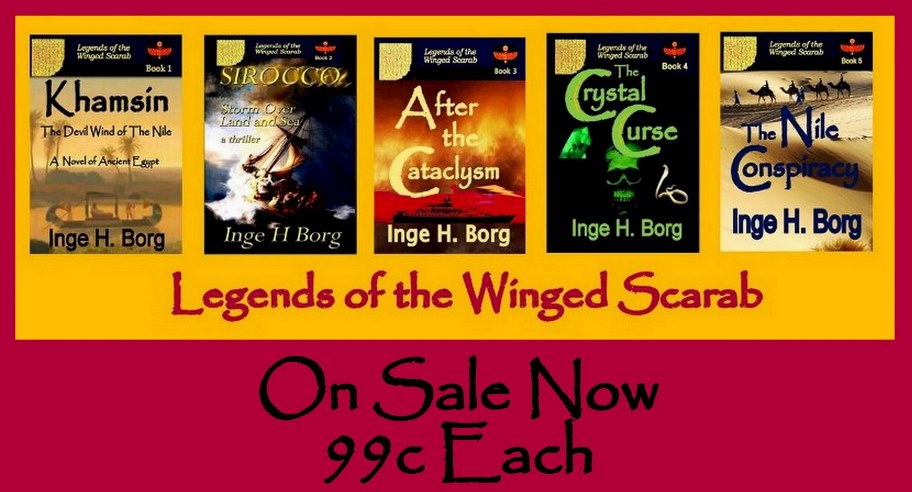
Borg’s Amazon Page: http://www.amazon.com/Inge-H.-Borg/e/B006QYQKUS
Read her Blog for more “Fact in Fiction” http://devilwinds.blogspot.com/
Follow Borg on Facebook: IngeHBorgAuthor
Twitter Handle: @AuthorBorg
My thanks to this weeks guest for a great post. I hope you all enjoyed it.
While you’re here, why not have a look around the site? There are FREE things and a whole lot more, just follow the links at the top of the page.
You might also like to join my team. I’ll send you a bi-monthly newsletter, filled with news, updates and extra content, as well as more about me and my worlds. You’ll also get a free short story and offers on my novels. Subscribe by clicking HERE
If you want to be featured in a future Showcase, where you can write about whatever (within reason) you want, then please let me know. Use the comment box below and I’ll get back to you.
You can catch up on previous Showcase posts by clicking HERE
Don’t miss the Saturday Rewind, next Thursdays Showcase post, and my musings every Monday.
Have a good week,
Richard.
![]()



Jack Eason
I wonder if Inge has read any of the fiction books by Christian Jacq or Wilbur Smith on the same subject?
Inge H. Borg
Indeed, I have. One wouldn’t attempt to write Egyptian Hist. Fic.without having read those eminent (albeit fiction) authors on the subject. However, between my “Khamsin” and their stories, thousands of years and dynasties had come and gone, and I had to take care not to fall into the glittering trap of preconceived 18th Dynasty splendor.